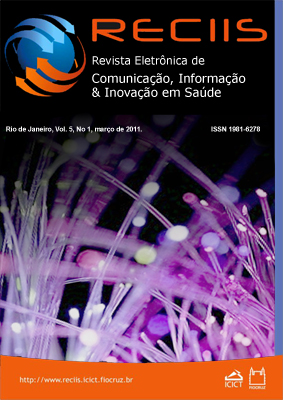The triad of scientific and technical information in the Health History and Cultural Heritage: virtual library, virtual community and network knowledge
DOI:
https://doi.org/10.3395/reciis.v5i1.478Keywords:
virtual library, virtual community, health information, collaborative networking, social networkingAbstract
The collective construction of network knowledge is nowadays considered a new paradigm for the development of knowledge. In this sense, virtual libraries, as a space of knowledge convergence, seek, through the establishment of social networks and content, to create facilitative resources of collaborative actions, which support and encourage activities aimed at information management. This article discusses the concepts of Network, Virtual Library and Collective Intelligence to reflect on the Virtual Health Library (VHL) model. It presents the Virtual Health Library - History and Heritage of Health (VHL-HPCS) as an example, which acts as an instrument of technical cooperation, and promotes networked collaborative work aimed at managing information and scientific and technical knowledge in this area. This is an initiative conceived and coordinated by the Latin-American and Caribbean Center on Health Sciences Information (BIREME / PAHO / WHO) for theconstruction and management of scientific and technical health.Downloads
How to Cite
Issue
Section
License
Author’s rights: The author retains unrestricted rights over his work.
Rights to reuse: Reciis adopts the Creative Commons License, CC BY-NC non-commercial attribution according to the Policy on Open Access to Knowledge by Oswaldo Cruz Foundation. With this license, access, download, copy, print, share, reuse, and distribution of articles is allowed, provided that it is for non-commercial use and with source citation, granting proper authorship credits and reference to Reciis. In such cases, no permission is required from the authors or editors.
Rights of authors’s deposit / self-archiving: The authors are encouraged to deposit the published version, along with the link of their article in Reciis, in institutional repositories.












